CrimeReads, as you may or may not have noticed (it’s just nice to know that you’re reading the site!), runs a whole lot of excerpts. We’ve been around for 8 months now, and we’ve run five excerpts a week since we launched. While every excerpt is a precious window into a new book, giving the reader the information they need to decide if they want to read the whole book, some excerpts function better as self-contained pieces of writing than others. Here are some highlights from our now-vast library of excerpts, selected for their ability to tell a small story within a larger story. These excerpts lean towards the lengthy, and many are complete short stories included in various anthologies released throughout the year. We hope you’ll take the opportunity to browse through our substantial archive of excepts and pick out some favorites of your own.
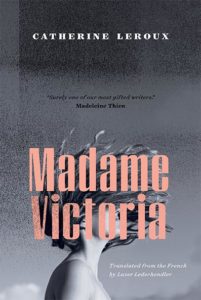
From Madame Victoria, by Catherine Leroux, translated by Lazer Lederhendler
Summary: In this passage, a caretaker for the elderly wonders about a mysterious corpse found on the grounds of the hospital where he works.
Standout Quote: “The information is shared and distributed throughout the country, but no one is able to identify her. For Germain, all the fuss and repeated failures do nothing but rub salt into the wound. He wishes they would leave Madame Victoria in peace now. After all, she may have wanted to die unobtrusively. Maybe she’d sought anonymity and solitude on purpose. And surely the whole circus over her bones must rankle her spirit longing for just a little silence so it can detach itself from this mountain pierced by such a heavy cross….Then, as Germain looks out at the canopy of trees and the roofs that speckle Mount Royal, he thinks again. What she wants is for someone to speak her name.”

From “The Walk-In”, a new short story by Harley Jane Kozak, included in the anthology For the Sake of the Game, edited by Laurie R. King and Leslie Klinger
Summary: In this passage, the narrator returns to her new flat to find that her brother’s cat, against all expectations, has turned into (or, more likely, been swapped) with a dog rather reminiscent of Winston Churchill.
Standout Quote: “It’s not every day that you walk into your apartment and find that your cat has turned into a dog. Okay, it was London, so it wasn’t an apartment but a flat; and neither the flat nor the cat was mine, they were my brother Robbie’s. But the dog was unequivocally a dog.”

“Eight Game-Changing Tips on Public Speaking”, by Sheena Kamal, included in the new anthology Vancouver Noir, edited by Sam Wiebe
Summary: In this innovative story, Kamal’s protagonist delivers a caustic sendoff to an errant colleague while gleefully pillorying the tenets of public speaking.
Standout Quote: “1. Smile, motherfucker.
It relaxes you on stage. You will not need to take a Xanax and fall asleep on top of Bridget the night before your big presentation, the one that you are flying into Seattle from Vancouver specifically to give. She has put up with too much of that shit already and girlfriend deserves a break. If you play your cards right, she may be compelled to share her suspicions that someone has been stealing from you for the past year, but whether or not that will happen depends entirely on your willingness to search for the mythical clitoris—which, let me tell you, actually exists. I can find it blindfolded with my arms tied behind my back. It’s right at the top of the—you know what? I’ll draw you a diagram.”
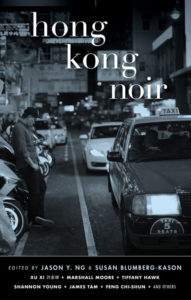
“TST” by Xu Xi, included in the anthology Hong Kong Noir, edited by Jason Y. Ng and Susan Blumberg-kason
Summary: In this feminist manifesto of a crime story, a greek chorus of bar girls recount their untimely demise at the hands of various customers, police inspectors, and others poised to exploit their vulnerability, while meditating on the nature of narrative and the passing of time.
Standout Quote: “There’s only one thing I’m sure of and that is that I have to keep talking-story until you hear me, until you truly listen, until you fix this mess you call life. Fix things so that girls like me can become women, need not always be enslaved, stripped, beaten, fucked, or treated like dolls, created just to satisfy impersonal lusts. You will hear us, me, one of these days, because I know you can if you try.”
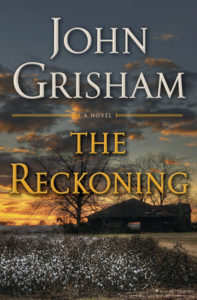
From The Reckoning, by John Grisham
Summary: In this exclusive excerpt from master of the legal thriller John Grisham’s latest novel, The Reckoning, set in 1946, a war vet wakes up knowing he’s headed in to town to do a dark deed, and this knowledge colors his actions across the morning.
Standout Quote: “On a cold morning in early October of 1946, Pete Banning awoke before sunrise and had no thoughts of going back to sleep. For a long time he lay in the center of his bed, stared at the dark ceiling, and asked himself for the thousandth time if he had the courage. Finally, as the first trace of dawn peeked through a window, he accepted the solemn reality that it was time for the killing. The need for it had become so overwhelming that he could not continue with his daily routines. He could not remain the man he was until the deed was done. Its planning was simple, yet difficult to imagine. Its aftershocks would rattle on for decades and change the lives of those he loved and many of those he didn’t. Its notoriety would create a legend, though he certainly wanted no fame. Indeed, as was his nature, he wished to avoid the attention, but that would not be possible. He had no choice. The truth had slowly been revealed, and once he had the full grasp of it, the killing became as inevitable as the sunrise.”
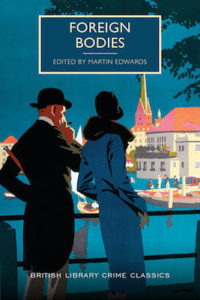
“The Spider” by Koga Saburo, translated by Ho-Ling Wong and John Pugmire, included in the anthology Foreign Bodies, edited by Martin Edwards
Summary: Here, you can read the full text of “The Spider,” by Koga Saburo, included in the British Library collection Foreign Bodies, a new anthology of early crime writing from around the world. In this story that harkens back to the diabolical dangers of an Edgar Allan Poe story, a scientist with a penchant for spiders pursues a twisted revenge.
Standout Quote: “I had visited the place several times when the professor was alive, and I was also a student of zoology, especially arthropods, so I should have been quite used to the sight; nevertheless it still gave me the shivers and I was rooted for a moment to the spot. Inside hundreds of bottles lining the walls, eight-legged monsters were running around and spinning their webs. Big Oni-gumo and Jorō spiders, yellow with blue stripes; Harvestmen with legs ten times longer than their bodies; Cellar spiders with yellow spots on their backs. The grotesque Kimura spider and trapdoor spiders, Ji-gumo, Ha-gumo, Hirata-gumo, Kogane-gumo: all these different kinds of spider had not been fed for about a month and, having lost most of their flesh, were looking around with shiny, hungry eyes for food. Some jars had not been properly sealed, and the escaped spiders had spun their webs on the ceiling and in the corners of the room. Countless numbers of the ghastly creatures were crawling around on the walls and ceiling.”

Smoking Kills, by Antoine Laurain
Summary: Smoking Kills is a black comedy about a man who stops smoking after hypnotism, only to realize when he starts again that he can now only enjoy a cigarette after killing. In this excerpt, the protagonist and his colleagues complain about the new smoking ban, and we’re introduced to the narrative of the protagonist’s budding criminality.
Standout Quote: “There are various ways to embark on a criminal career. The first is to discover you have a calling. Serial killers are an excellent example: from an early age they feel different and experience strong animosity to the world around them, coupled with a highly questionable determination to shape it to their own ends. Psychopathic, schizophrenic, paranoiac: medical terminology abounds for those who choose to dispatch their neighbour, often with elaborately staged savagery. And yet, since they repeat the same type of crime over and over again, they are quickly identified and generally end up behind bars, where they keep their psychiatrists happy and, more recently, make novelists rich. It’s very important to distinguish the murderer, who is an occasional killer, from the assassin, who is a professional. The murderer may be the unhappy cheated-on husband who, on discovering his misfortune, seizes his hunting rifle or his lobster knife; if his career ends there, he will just be called a murderer. But the assassin makes a career of murder. The number of murders and the resulting criminal record determine his right to the title. A murderer could also be a bank robber who finds himself cornered by the forces of law and order, uses his weapon and kills two or three police officers. He’s dangerous, but he’s motivated by money, not by bloodlust. That said, the desire to grab someone else’s cash regularly leads to violent misunderstandings with bank cashiers.”
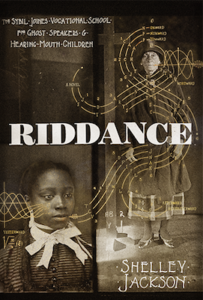
From Riddance by Shelley Jackson
Summary: Experimental novelist Shelley Jackson is previously known for a novel written entirely in tattoos. In this excerpt from the narrator’s introduction, we learn of strange doings at the Sybil Joines Vocational School for Ghost Speakers and Hearing-Mouth Children.
Standout quote: “I had never heard of the Sybil Joines Vocational School. That alone would have pricked my curiosity, since I had flattered myself that I knew quite everything there was to know about the spiritualist movement in late nineteenth to early twentieth-century America. But my discovery also resonated with another of my research interests, the proliferation and popularization of what one might call speech studies: stuttering “cures”; elocution; orthoëpy; Major Beniowski’s “anti-absurd” or “phrenotypic” orthography (it luks lyk this), Pitman and Gregg shorthand, and other methods of supplanting the arbitrary signs of written language with a sort of “score” based on the sounds of speech. I am only human: the murder intrigued me too. Had the mystery been solved? Suppose I could solve it?—with the methods of scholarship, of course!”

From City of Ash and Red, by Pyun Hye-young
Summary: From the winner of Shirley Jackson Award in 2017, City of Ash and Red is a chilling new thriller in which we follow a rat catcher accused of murder in a dystopian future beset by mysterious contagion. In this exclusive excerpt, the rat catcher wonders at his own memories, as the net tightens around him.
Standout Quote: “The dropped knife was as stiff as the look on his face. He opened and closed his empty hand. Just because the knife had felt familiar, just because he could still feel it in his hand, just because his hand remembered the exact sensation of it, did not mean that he had stabbed his ex-wife. Knife handles were all the same, any one of them would feel familiar at first. But regardless of the truth, the moment he picked up the knife and let it fall, the moment that uncanny tremor ran through his body, he felt the world coming toward him, a world as cold as a blade and as blunt as the heel of a knife.”

















